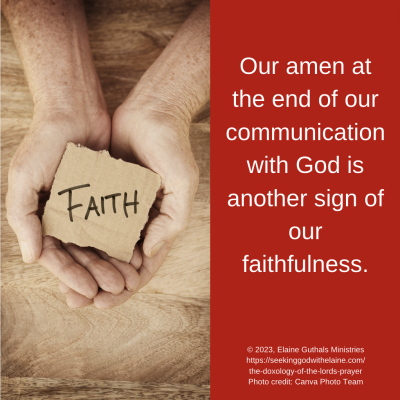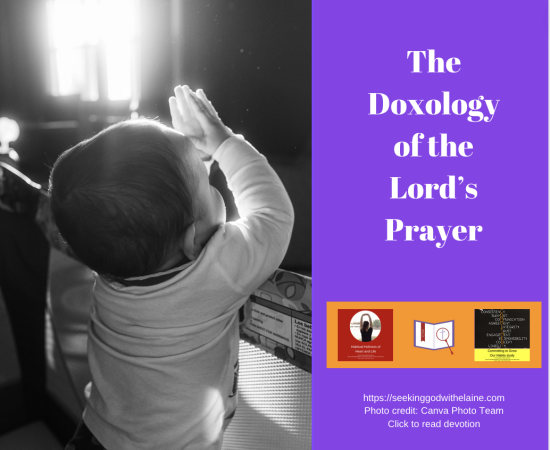The ending of the Lord’s Prayer is cut off in almost all translations of Scriptures. This devotional reading looks at Jesus’ final act of praise in His model prayer.
Nuggets
- We must praise God for His spiritual kingdom.
- We must praise God for His unmatched power.
- We must praise God with honor and reverence.
- Our praise to and worship of God will never end.
- We seal our prayers with an Amen.

The King James Version is the only translation that ends the Lord’s Prayer with an Amen.
I get there are different scrolls that say different things. That is why the kingdom, power, and glory part is left out of all other translations.
But Jesus ended the prayer and didn’t say Amen? He didn’t say goodbye to His Abba???
I have problems with that.
Not only was the last phrase lopped off, but also the last part of the temptation phrase was just ignored.
Let’s take a look.
Let's Put It into Context
To read devotions in the Habitual Holiness of Heart and Life theme, click the button below.
Here is a running list of nuggets for the theme.
Devotions in the Commit to Grow Our Habits study
Here is a running list of nuggets for the study.
“And lead us not into temptation, but deliver us from evil: For thine is the kingdom, and the power, and the glory, for ever. Amen” (Mt. 6: 13 KJV)
The Kingdom
“… For thine is the kingdom…” (Mt. 6: 13 KJV)
We must praise God for His spiritual kingdom.
Part of the reason I am confused about the kingdom, power, and glory being left out is that it is flat out thanksgiving and praise. Jesus would have been worshiping His Father.
The entire prayer is building to here, where Jesus can cut loose and fully praise and worship God. He wouldn’t leave this out.
No, a lot of times we get the praise wrong. We give thanks to God for what He has done for us. We may even paise Him for the spiritual graces He has given us.
But we don’t always praise God for Who He is. We miss the most important part.
We have to acknowledge that it is only God’s alone — Thine.
We are glad He provides us a job (most of the time), but we also have to be thankful he sent His Son to die for us. We can’t just be thankful for the physical aspects of our lives.
I love how Saphir put it. He wrote, “Praise is the language of the soul in communion with God.”
Resource
That is what we have been focusing on during this study of the Lord’s Prayer — communication with God. We have to speak with Sovereign God.
We have to be thankful for God’s kingdom. We have to be thankful for the spiritual aspects.
We already spent a devotion on God’s kingdom. It is universal. All mankind — dead and alive — will be subject to Sovereign God. This will last for eternity.
One day, God will send Jesus to call the saints home. God has that authority.
Barrow discussed this. He wrote, “Thou hast a perpetual and [unmovable] authority whereby justly to dispose of all things …”
Resource
It is God’s right alone to be Judge and Ruler. His wrath at our disobedience will finally be relieved.
The only reason this can happen is because Jesus completed the Plan of Salvation. He paid the debt for our sins.
God’s new kingdom will be perfect. That is because we will be pure as God is because of the absence of sin.
Sin is not believing that Jesus is our Savior to save us from our actions by humans that disobey God and break one of His reasonable, holy, and righteous laws and commandments, goes against a purpose He has for us, or follows Satan’s promptings.
Perfection means we reach a state of maturity because the combination of the spiritual graces form, when all are present, spiritual wholeness or completeness — holy, sanctified, and righteous.
- Spiritual graces are worldly morals that have been submitted to God to further His kingdom instead of enhancing this world.
- Holy means to be set apart — because of our devotion to God — to become perfect, and morally pure while possessing all virtues and to serve and worship God.
- Pure means not being sinful or having the stain of sin.
- Virtues are standards of moral excellence.
- Sanctified means to be set free from sin.
- Righteous means we are free from sin because we are following God’s moral laws.
Glossary
We can’t miss the opportunity to praise God for His perfect kingdom, in which we will spend eternity.
The Power
“… and the power…” (Mt. 6: 13 KJV)
We must praise God for His unmatched power.
God doesn’t have just any power. His power is, as Barrow put it, “… an indefectible and irresistible power, whereby Thou canst effect whatever seems just and good to Thee.”
Resource
God’s power is not going to go away on January 31, 2035. God’s power is eternal.
Scriptures tell us that “for it is written, ‘As I live, says the Lord, every knee shall bow to me, and every tongue shall confess to God’” (Rom. 14: 11 ESV). No one is going to be able to resist Him.
No part of this world is exempt from God’s power. Neither earths most intelligent being, nor its most powerful leader, is absolved from God’s power. All the Church, along with Satan and his demons, will all bow before Jesus.
Because of that, we should seek Jesus as our Savior now. We don’t want to wait another day, another minute.
In a recent devotion, we talked about desires. Edwards talked about what this power means to children of God. He wrote, “That the power by which our desires are brought about is Divine, and not human.”
Glossary
Resource
We can’t rely on our own intelligence and understanding, as Barrow said. God should be the One to control our hearts’ desires.
The Glory
“… and the glory…” (Mt. 6: 13 KJV)
We must praise God with honor and reverence.
Jesus said that all the glory belongs to God. Glory expresses the essence of God — His majesty, splendor, and beauty — representing the attributes of God resulting from His authority and holiness.
It isn’t up to us to work everything out until we understand, and then submit to God. We have to give up our understanding and take on faith that God is supreme.
Faith is a gift from God and a work of the Spirit that enhances the conviction that the doctrines revealed in God’s Word are true, even if we do not understand all aspects of them, a belief which impacts our lives and distinguishes us from others.
Glossary
Worship has to be objective. We have to keep our minds open to God doing the impossible (Lk. 1: 37).
We have to raise ourselves to God’s level rather than lowering him to ours. Only that way can we approach Heaven.

Forever
“… for ever…” (Mt. 6: 13 KJV)
Our praise to and worship of God will never end.
Manton described what this looks like. “For ever. All excellencies which are in God, are eternally in God.”
Resource
We have no concept of what forever actually is. We have not been alive forever.
This is just one of the things we have to leave for God’s understanding. We have to take it on faith that there is a forever and that, being a child of God’s, we will be with Him for that time.
Amen
“… Amen” (Mt. 6: 13 KJV)
We seal our prayers with an Amen.
By saying amen to our prayers, we agree with what we have said and accept God’s answers to those prayers. We are firm our belief in God’s truth and faithfulness.
Our amen at the end of our communication with God is another sign of our faithfulness.

By giving this sign, we also commit to deepening our devotion to God. We clear our conscience.

Making the Connections #1
Did you notice what the Lord’s Prayer doesn’t have a lot of? Father, heal Andrew. Help Peter in his marriage. Change James’ and John’s character. (Please take the thunder out of them!)
What does most of our prayers contain? Supplications for things in this world.
We need to refocus on God.
Making the Connections #2
Sometimes, when we pray, we are not confident in our prayers. We feel God will not accept them.
We have nothing to worry about when we are truly God’s children, asking completely in His will.
Edwards talked about this. He wrote, “Our confidence in the acceptableness of our prayers is derived from God and not from ourselves.”
Resource
That is great advice. God alone determines if our prayers are acceptable.
How Do We Apply This?
- Remain steadfast in our faith in God.
- Remain confident that God will answer our prayers.
- Be committed to praying.
- Expect God’s abundance in answering our prayers.
- Remember God is eternal and unchangeable.
- Gain peace through prayers, regardless of the situation.
- Praise God to grow our faith and prepare for Heaven.
- Praise God for Who He is, not what He has given us.
- Search for and seek God.
- Give up on knowing the how of things.
- Possess limitless adoration for Him.
- Acknowledge and appreciate gods omnipotence.
- Deep in our devotion to God.
Searching for and Seeking God
Hearing His Word (Rom. 10: 17)
Reading His Word (Rev. 1: 3)
Praying to Him (Heb. 4: 16)
Studying His Word (Ac. 17: 11)
Meditating on His Word (Ps. 1: 1-2)
Memorizing His Word (Ps. 119: 11)
Resource
Our Father. You are Sovereign God. Your kingdom is eternal. Your power is omnipotent. Your glory is beautiful. Thank You for letting us communicate with You. Grow us to be more like You. Amen.
What do you think?
Leave me a comment below (about this or anything else) or head over to my Facebook group for some interactive discussion.
If you don’t understand something and would like further clarification, please contact me.
If you have not signed up for the email providing the link to the devotions and the newsletter, do so below.
If God has used this devotion to speak with you, consider sharing it on social media.